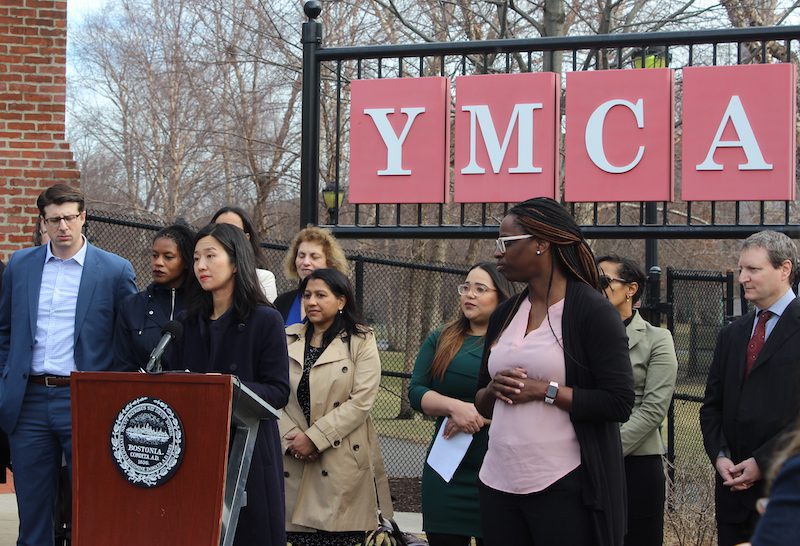
Mayor Michelle Wu on Feb. 23 announced the creation of a new Office of Early Childhood aimed at closing equity gaps in child care across Boston. She also used the opportunity to voice support for state Common Start legislation that looks to achieve similar goals through funding to families and child care providers across the commonwealth.
Informed by data from Boston’s 2021 Childcare Census, which asked families to answer questions relating to how their children are cared for on a daily basis and at what cost to parents or guardians, Wu’s office identified a lack of accessibility and affordability in the city’s child care marketplace.
“It is time to truly tackle root causes to understand just how much our child care infrastructure is the foundation for families to thrive all across our city and beyond,” Wu said last Wednesday morning, joined by city and state officials outside the East Boston YMCA.
According to data from the city’s child care census, the majority of respondents were interested in putting their children into a formal care center, while those that were able to access such options are barely able to afford to do so. Census data shows 41% of children in the sample are in care arrangements whose cost exceeds 10% of their family’s income.
The new Office of Early Childhood looks to expand child care options for families with children under 5 — both through programming for child care entrepreneurs and through investments to expand existing programs.
According to a press release from the city, the office will be investing in the early education and childcare workforce by “building sustainable career pathways that recognize early educators as professionals who are essential to young children’s wellbeing.”
Additionally, the new office hopes to build on the work being done by the existing Mayor’s Office of Women’s Advancement (MOWA), which has already created a grant program for family child care providers to gain business skills and receive flexible funding and has been in charge of the city’s annual child care survey. MOWA is currently “rolling out opportunities to support early education professionals and childcare facilities with funding from the American Rescue Plan Act,” according to the press release.
“Up to this point the Mayor’s Office of Women’s advancement has worked to close the child care gaps with community voices and centers,” said Alexandra Valdez, MOWA’S executive director. “With the Office of Early Education, we are deepening the city’s investment in high quality accessible child care solutions to early childhood professionals, families, and of course, their little ones.”
As for the accessibility piece, the new office looks to create a “one-stop shop” for parents looking for information and access to early education and child care programs. City officials say the office will include an “accessible, multilingual platform so that options are clear, streamlined and accessible to all families.”
In addition to MOWA, the city is partnering with the Boston Public Schools, the Boston Public Health Commission, Boston Centers for Youth and Families and community organizations to achieve its strategic goals.
BPS plays a leading role in the city’s current child care operations with programs such as its universal pre-K (UPK), which currently serves 664 pre-K students through 21 community-based organizations across 32 program sites; 2,556 non-special-education K1 seats for 4-year-olds, and 880 special education seats for 3- and 4-year-olds in K0/K1.
As part of her campaign, Mayor Wu promised to expand UPK. In the latest release, her office states that for the upcoming school year in 2022-23, Boston UPK will increase its capacity in order serve up to 930 children, including 600 4-year-olds and 330 3-year-olds. The city of Boston and BPS recently released an invitation for bids (IFB) to identify additional community-based organizations seeking to join the UPK program.
“Universal preschool has not only transformed community-based programs … it has also changed the way we do kindergarten and first and second grade through changes in curriculum,” said Jason Sachs, BPS director of Early Childhood. “Early childhood principles are beginning to permeate into the public schools –– families first, social-emotional relationships, strong early childhood instruction, play and joy in classrooms. Early childhood is something that we all need to embrace.”
Wu said the city will be hiring a leader for the new office immediately. She told reporters on Feb. 23 that beyond that, a timeline of the office’s development is still uncertain. Also uncertain is the office’s budget, to be discussed as part of next year’s bottom line.
As part of the press conference, officials also urged families to fill out the 2022 Childcare Census. Families with at least one child between the ages of zero and 5 are encouraged to complete the online survey, available in seven languages here. Alternatively, families can fill out the physical survey, which was recently mailed to City of Boston residents along with the Annual City Census. More information on the Mayor’s Office of Women’s Advancement and its annual Childcare Census Survey can be found here.







